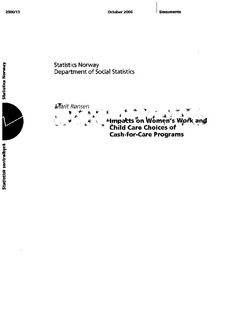| dc.description.abstract | This study assesses the short-term effects on women's combined work and child care choices of a novel
Norwegian family policy program: the cash-for-care benefit ("kontantstøtte"). Based on cross-sectional
data from two sample surveys carried out just before and just after the reform, multivariate analyses
indicate that there has been a small decline in the work probability of most mothers after the reform,
except among those at the highest educational level. Further there has been a shift from work combined
with subsidised care to work combined with non-subsidised care, as well as a shift from full-time to
part-time work. The impact differs according to educational level. As expected, the choices of mothers
at the upper university level have become more dissimilar to the choices of mothers with low education,
but somewhat surprisingly, the choices of mothers at the middle university level, and especially with
teacher training background, have become more similar to the lowest educational group. Hence, there
are increasing differences in behaviour even among university educated mothers. | nb_NO |
